Caroline Leavitt's Blog, page 115
February 27, 2012
Anita Nair talks about The LIlac House, Greek myths, crime and more
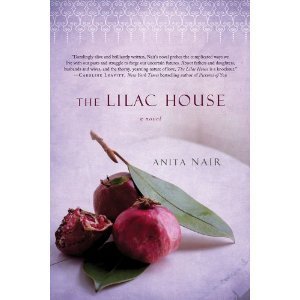
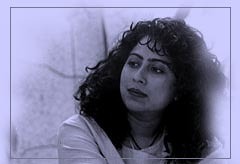
I was sent The Lilac House to blurb, and I think I was enraptured by the second paragraph. About grief, recovery and the way two people make a connection, The Lilac House is as engrossing as it is haunting. I'm honored to host Anita Nair here.
I was really interested in the structure, how you told Meera's story, and then Jak's and slowly the two converge. Was this by original design or did this happen during the writing? And do you map out your novels before you begin or are you the kind of writer who simply discovers the story as you are writing it.
The cyclone happens when a hot steam of air and a cold stream of air converge. Hence I wanted to carry this phenomenon into the narrative structure as well and so arrived at two streams of thought namely Meera and Jak's. This was part of the original design as the novel came into its own when I decided to use the cyclone metaphor. In fact in many ways that has become the pattern of my writing. First the idea, then the metaphor that captures the idea the best and from it stems the writing.I don't really map the story out but somewhere in my head is a beginning and an end…. The exciting thing for me to get from that point A to point Z
Can you please talk about the role of Greek myths in the story? And how you came to write the knockout Thereafter... ending. I'd also like to know if you feel we can ever make peace with our pasts.
I was reading Robert Grave's The Greek Myths and suddenly it occurred to me that the gods and goddesses of Greek myths are probably just as human as we are with none of the guilt we seem to be burdened with. Their depths of degradation are as low as they are triumphs. It makes a great metaphor. And Hera seemed the capture all that Meera was and hoped to be.The Lilac House would have ended very bleakly for both the reader and me if it had ended without The Thereafter. And so I decided that I would work in that final image of hope. No rainbows and tinsel streaked horizons but a glimmer of hope which is enough for most of us to move on. I am not certain that we ever make peace with our pasts. But we need to make that effort to come to terms with it.
What is obsessing you now?A crime novel that I began on a whim. I am not even a reader of crime fiction in general. Nevertheless some strange power drove me into writing a first chapter and thereafter I had to delve within and around me to be able to carry it forward. It was a world that I was not familiar with. But sheer doggedness in terms of research has propelled the novel forward. It's also writing out of the comfort zone which makes me that much more satisfied with every chapter written. Especially as very few crime novels have emerged from India. So going into territories that others haven't makes me feel a bit of a pioneer and super sleuth.
What question didn't I ask that I should have?Well, you have asked me all the important ones so there isn't any I can think of either…
Published on February 27, 2012 13:14
February 24, 2012
Dan Chaon talks about Stay Awake, Suzanne Vega, buttering up his toast and more!
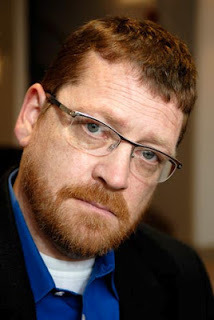
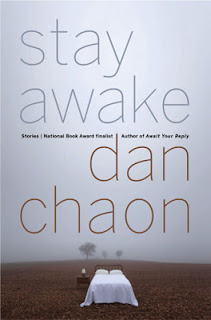
What's so terrific about Dan Chaon is that not only is he one of our most celebrated and brilliant authors, but he's also outrageously funny, totally hip, warped-in-the-best-way and an all around great, great guy.
Among the Missing was a finalist for the National Book Award, You Remind Me of Me was named one of the best books of the year by The Washington Post, The Chicago Tribune, the San Francisco Chronicle, The Christian Science Monitor and Entertainment Weekly. He also is the recipient of the 2006 Academy Award in Literature from the American Academy of Arts and Letters. Stay Awake, his latest collection, is not only racking up the raves, but it also had me so unsettled that I dreamed about it--and I still feel haunted.
I can't tell you how much fun it is to have Dan here on my blog again (and psst Dan, re your last question: I have the perfect person but she's a die-hard New Yorker and can't move until her girls are in college in 3 years!).
A zillion thanks, Dan!
So, I have to ask, because you're so modest, what does it feel like to be the toast of the literary world?
As toast, I enjoy being buttered up.
I read that you're writing the script for Await Your Reply. What's the process like, especially in adapting your own work. Do you see things you wish you would have changed when you were originally writing the novel, or do you see the film as a different entity altogether? And did you teach yourself how to write scripts or was this a skill you already had?
I started out as a film major in college, and my heroes were Hitchcock and Welles. Then I realized that film was all about collaboration, and, being a control freak, I got discouraged. I drifted over to fiction writing and got stuck in it, since I liked the fact that it allowed me to be actor/director/writer/producer/set designer/makeup consultant/etc. and I didn't have to worry about budget issues.
When the production company Anonymous Content asked me if I would be interested in writing the script for Await Your Reply, I was really surprised, and I took some time to think about it before I accepted the challenge. I had to get my mind around the idea that, whatever I wrote, it would just be a blueprint for a big collaborative project that would involve a great number of people.
But I liked the work of the guy that they had chosen as a director, Frederic Planchon, and it seemed like a chance to revisit my early interest in making films, so I decided to roll with it.
The biggest issue was that a huge part of the novel was interior. Most chapters involved characters thinking about stuff, rather than actual dramatized scenes. So that had to be dealt with. Ultimately, the screenplay became a very different creature than the novel. I expect that, as things go forward, it will become even more different.
The good thing is that the novel will always exist as itself. Whatever happens with the film is not in my hands, and that is pretty interesting. I've gotten to a point where I'm less concerned about controlling everything, and I'm just curious to see what the seed will grow into, once it has been chewed and digested and reconfigured by many minds. It might be awful or it might be really cool. But in the meantime it's fun to participate in it.
There a huge sense of anxiety in these stories, almost an encroaching dread of ghost stories (the Bees kept me awake at night), and yet there's also a kind of humor sifting through. Do you think people can ever find peace or be able to really reinvent themselves? Do you think that who we are is sort of like a stain we can't get out?
That's the big question, isn't it? I don't know the answer, though I've spent my life thinking about it constantly.
I have lived my life in a state of constant reinvention. I was adopted as an infant. My mother claimed that she "picked me out," that she got to walk through a room full of adoptable babies in cribs and that she chose me. I kind of doubt that is true, but it certainly affected my sense of myself, the sense that I've always had that "who I am" is random, the result of caprice rather than fate….
In AWAIT YOUR REPLY, one of the characters thinks "You could be anyone," and I don't know whether that is a blessing or a curse.
The stories in STAY AWAKE are also full of people who want to reinvent themselves, to escape into new identities in one way or another, and who succeed and fail to varying degrees in that endeavor.
Do I think they will ever find peace? No. But I'm not sure that "finding peace" is an achievable goal, or even a goal that I'd personally want for myself. There is one guy in my story "Long Delayed, Always Expected" who seems to have found peace, but he is irrevocably brain damaged.
I'm curious about the title. Can you talk a bit about it?
It's from a song from the movie Mary Poppins. In 1988, not long after I finished college, Hal Willner put out a compilation of covers of Disney songs on A&M Records called "Stay Awake: Various Interpretations of Music from Vintage Disney Films." The album contained an incredibly sinister and spooky a cappella version of "Stay Awake" sung by Suzanne Vega. Even as a young man, I knew that I wanted to write a story about the feeling that the song had evoked in me, and I had that title in my notebook and I knew that it would become something someday. I only had to wait 25 years.
What's obsessing you now?
I'm at a point where I'm waiting for the next obsession to appear. So you could say that I'm obsessing about not having an obsession. Lame. I'm sorry.
What question didn't I ask that I should have?
Can you hook me up with an awesomely cool single friend of yours?
Published on February 24, 2012 12:30
Deborah Henry talks about The Whipping Club, Jews in Ireland, research and obsessions
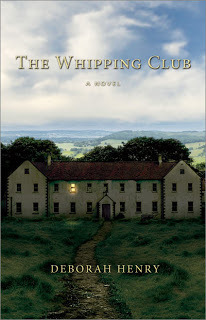
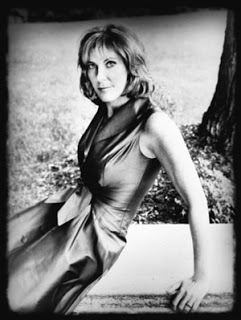
I'm so honored to have Deborah Henry here talking about her new novel, The Whipping Club. Thank you, Deborah!
I'm always interested in process. Can you tell me where and how the seeds of this novel sprouted?
I was barefoot in the grass, playing with my children in our backyard. I was marinating, as I call the pre-writing phase. Born of a Jewish father and an Irish Catholic mother (though not immigrants) it dawned on me: What would my parent's relationship look like if they had met and married in Dublin in the 1960's? The answer was not good. Interfaith marriages were unacceptable. Being a child of a mixed marriage, I wondered about a fictitious child born to such a couple. My budding story evolved into a manuscript rife with uncanny similarities to harsh events that took place in Irish orphanages. The more I researched, the more I uncovered a hidden Ireland, an island in which thousands of adults and children were forcibly separated, many of them "orphans" adopted by American families, and many still live with a vague sense of identity and a yearning for connection to their roots.
Everything about this novel is so alive. What was the research process like? What surprised you?
I remember reading JEWS IN TWENTIETH CENTURY IRELAND: Refugees, Anti-Semitism and the Holocaust by Dermot Keogh at the beach, and a friend saying, "You mean all three of them?" I joined a group called The Irish JIGS – The Irish Jewish Interest Group and had the pleasure of visiting a section of Dublin called "Little Jerusalem." I also had the great opportunity to meet with a number of the prominent Jewish community in Dublin, including the family of Robert Briscoe, the first Jewish Lord Mayor of Dublin, and found their contributions to business, law, medicine and the arts in Ireland far greater then their numbers would suggest, far greater than most people are aware.
I have interviewed Mary Raftery and Mike Milotte, award-winning Irish journalists, and have received firsthand the personal testimonies of the survivors of Magdalene laundries, Mother Baby Homes, Orphanages and the Industrial School Systems, receiving generous help from the best-selling authors, Bernadette Fahy and Paddy Doyle. I spent the better part of two years engrossed in nonfiction titles and writing down questions. I traveled to Ireland when the research and question sheets became excessive and there, I would study the smells in the air, the people, the sounds on the street – all the nuances of Dublin and the suburbs of Dublin where much of the book takes place. Every trip also included interviews with police officers, lawyers and members of the RTE. Overseas, I would search video stores and find films relating to any of my subjects. Mostly, I found country dramas involving unwanted pregnancies, and converted them to the United States VCR recording system, and listened as well as watched everything, including mannerisms, dress, flora and fauna, and idiosyncrasies of the culture. I spent hours at the Irish Jewish Museum, walking the streets of Little Jerusalem in Dublin, interviewing the elderly at the Jewish Nursing Home. I also spent time with homeowners in Donnybrook.
My grandmother Sara Conroy, who hailed from the North of Ireland and I, were very close. There is a photograph of my deceased grandma above the mantelpiece in my office. She had grown up on a farm and rode horses and ate well, so I was quite shocked and dismayed when I learned about this underbelly of Ireland. The undercurrent of darkness, the anti-Semitism and, especially, the cruelty to children, disturbed me. I read some incredibly well documented books which helped me uncover these sorrowful subjects. Banished Babies, The Secret History of Ireland's baby export business by Mike Milotte and the late Mary Raftery's groundbreaking work Suffer the Little Children: The Inside Story of Ireland's Industrial Schools along with heartbreaking memoirs by Mannix Flynn, Patrick Touher, June Goulding, among others. I realized, too, that this wasn't an Irish problem alone. This was, and is, a worldwide epidemic and needs to be exposed.
There is a photograph on my desk of 5 Mount Eden Road which bears a remarkable resemblance to the Ellis family residence I had described years before in my novel. There is a drainpipe which Jo used to climb down from her bedroom window. As I walked along the lovely roads in Donnybrook, I stopped in front of this home, which looked identical to what I had written. These neighbors invited me for tea and walked me through their gardens so I could learn more about the natural surroundings, all of which helped with texture in my story. There were other instances of uncanny similarities to chapters I had written years earlier. In one scene, Jo falls though a stained glass second floor window ledge and lo and behold, The Donnybrook Church has stained glass windows and a ledge on the second floor. These were interesting moments; moments of intense synchronicity. Brief but wondrous, like pieces of a puzzle perfectly dropping into their rightful place.
The novel has a great deal to say about the secrets we keep and the ones we feel compelled to reveal. But what really interested me was how grace can be found in the bleakest of moments. Can you talk a bit about that?
I never really know what the story is about until the end. The protagonists Marian McKeever and Ben Ellis in THE WHIPPING CLUB feel enormous shame and guilt about the sacrificial secrets they kept from one another during their marriage. There is also loads of anger and resentment toward the Irish society's social and religious intolerance that this interfaith couple and their children must endure. In the end, though, the characters, battered down in every possible way, let go of their hate. A sense of forgiveness for their younger selves, for the missteps that have shaped the arc of their lives, and for the society in which they live, takes hold of them. The nobility of forgiving one's self and forgiving others, in an authentic manner, seems to emerge for me often. It is the highest calling. I tried to find the humanity within each character and eventually, as they began to breathe on their own, many of the characters struggled to find the light within their own secret darker selves.
What was the actual writing like?
It took me well over five years to research and write THE WHIPPING CLUB. In the early years, I would drop my children at school and drive to a deserted field and write in my car until pick-up time. During the summers, I would get up at 4:45 a.m. to write for a few hours before the first birds sang and before my children awoke. As the work developed, I would hole up in Dublin at the Shelbourne Hotel and also, The Killiney Castle Hotel, to rewrite, edit, and conduct interviews. I like settling into a routine of writing every morning for at least four or five hours. Three years ago, we moved to a different home in the same town of Fairfield, Connecticut, which upset my writing space a bit. My office now is much fancier and sort of in the middle of adjoining rooms – all of which is distracting, so I have built bookshelves in a room in the basement with no heat/air conditioning and no windows, which seems suitable for writing. I need complete quiet to think which is why getting up so early is helpful. Sometimes, I drive to the beach and write in my car.
Other than the intense passion I have for my three children, I have never experienced enthusiasm the way I feel when I write. Although there were only a few moments, "moments of clarity" I call them, moments when those missing puzzle pieces fall into place as if they were always there waiting to be found, these moments made up for all the years of failing and retrying, all the early hours, all the hard hours, all the grueling day after day and night after night efforts. What's obsessing you now?
I have begun another novel with the working title, MADNESS, which takes place during the French Occupation in Paris and follows the travails of a French woman (married to a Jewish man) who has a relationship with a German soldier. In today's publishing climate, as authors in both traditional and independent publishers are required to do oodles of publicity, I am busy with THE WHIPPING CLUB, but the budding story is thankfully, growing.
Published on February 24, 2012 12:14
Ron Hogan 's new venue for interviewing authors!
This is from the incredible Ron Hogan, a friend to writers and readers and I want to pass it along.
Most of you are familiar with the Beatrice.com website, and some of
you might even have done interviews with me over the years. I'm
putting together a new version of Beatrice -- an app that will publish
feature-length interviews with authors of fiction and nonfiction, as
well as streaming video from those conversations. I've already got one
issue -- featuring acclaimed memoirists Darin Strauss, Deb Olin
Unferth, and Alina Simone -- just about ready to go, and several more
interviews already taped. But I'm asking for a little help with the
initial development, which is why I've launched a Kickstarter
campaign:
http://www.kickstarter.com/projects/728826825/beatrice-an-app-full-of-author-interviews
If I can raise enough funds by the end of March, I'll be releasing the
Beatrice app for free; the more I'm able to raise, the more interviews
I'll be able to share before charging for new issues. I'm really
excited about this project -- I think it's a great way to extend
Beatrice's mission of introducing readers to great writers -- and I
hope you'll believe that a new publication dedicated to raising
authors' profiles is worth supporting.
Whether or not you're able to support it directly, though, please
consider spreading the word to your friends -- and, for those of you
who have an online presence, to your readers. The more people hear
about this project, the more likely it becomes that enough people will
contribute to the campaign to make it a success. If you're on Facebook
or Twitter, and you'd like a shorter URL to share with your friends
and followers, you can use http://kck.st/wW23D5
Thank you for hearing me out -- and for any support that you're able to give!
Yours,
Ron Hogan
Most of you are familiar with the Beatrice.com website, and some of
you might even have done interviews with me over the years. I'm
putting together a new version of Beatrice -- an app that will publish
feature-length interviews with authors of fiction and nonfiction, as
well as streaming video from those conversations. I've already got one
issue -- featuring acclaimed memoirists Darin Strauss, Deb Olin
Unferth, and Alina Simone -- just about ready to go, and several more
interviews already taped. But I'm asking for a little help with the
initial development, which is why I've launched a Kickstarter
campaign:
http://www.kickstarter.com/projects/728826825/beatrice-an-app-full-of-author-interviews
If I can raise enough funds by the end of March, I'll be releasing the
Beatrice app for free; the more I'm able to raise, the more interviews
I'll be able to share before charging for new issues. I'm really
excited about this project -- I think it's a great way to extend
Beatrice's mission of introducing readers to great writers -- and I
hope you'll believe that a new publication dedicated to raising
authors' profiles is worth supporting.
Whether or not you're able to support it directly, though, please
consider spreading the word to your friends -- and, for those of you
who have an online presence, to your readers. The more people hear
about this project, the more likely it becomes that enough people will
contribute to the campaign to make it a success. If you're on Facebook
or Twitter, and you'd like a shorter URL to share with your friends
and followers, you can use http://kck.st/wW23D5
Thank you for hearing me out -- and for any support that you're able to give!
Yours,
Ron Hogan
Published on February 24, 2012 12:07
February 18, 2012
Jodi Picoult talks about Lone Wolf, the Holocaust, and more
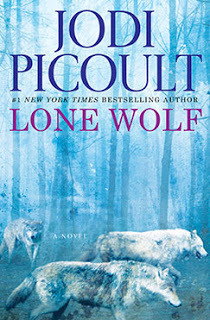
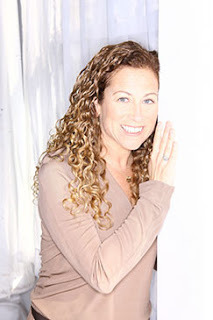
If there is a real life Supergirl, I'd have to say it's Jodi Picoult. The mega-bestselling author of 19 novels (with a new one coming up, co-written with her daughter) has won over zillions of fans with Songs of the Humpback Whale, Harvesting the Heart, Picture Perfect, Mercy, The Pact, Keeping Faith, Plain Truth, Salem Falls, perfect Match, Second Glance, My Sister's Keeper, Vanishing Acts, The Tenth Circle, Nineteen Minutes, Change of Heart, Handle With Care, House Rules, Sing You Home, and Lone Wolf--the last five debuted as number one New York Times bestsellers.
She's been awarded the New England Bookseller Award for Fiction, she's a recipient of an Alex Award from the Young Adult Library Services Association, she won the Book Browse Diamond Award for novel of the year, a lifetime achievement award for mainstream fiction from the Romance Writers of America, Waterstone's Author of the Year in the UK, a Vermont Green Mountain Book Award, and more. Her books are translated into 34 languages in 35 countries and she also wrote five issues of Wonder Woman comics! The Pact, Plain Truth, The Tenth Circle and Salem Falls have all been made into TV movies, while My Sister's Keeper was a big-screen release.
She also has a musical play, she also makes it her business to work for important causes like gay rights, and time after time, she wins the award for "most generous, supportive writer on the planet." She also has great hair! I'm thrilled to host Jodi on my blog again.
Jodi, a million thanks are not enough for you.
I love the opening quote from Margaret Atwood, "All stories are about wolves." But I also think this book has one of the best first lines I've ever read "In retrospect, maybe I shouldn't have freed the tiger." Where did that line come from? `
I went to see the Big Apple circus one night and literally woke up with that sentence in my head the next morning. I realized that Luke would have had a singular moment in his life - a memory - that would have somehow been the fulcrum upon which his whole world turned. For him, it was understanding that captivity chafes, whether you're human or animal. It's why - even though he wants to have a family as tight and secure as a wolf pack, he can't confine himself in the role of husband and father. It also gives us as readers the first glimpse into Luke's mind in terms of what it means to die on one's own terms.
There' s a lot in the book about why people stay and why they might feel compelled to leave, both their lives and situations. Without giving anything away, I wanted to ask, if you could imagine Luke ten years after the novel. What do you think he'd be doing? How would he have changed from this experience?
Boy - that's a hard one to answer without giving away a spoiler! Well, I think that Luke would continue to think he could do better as a parent…only to realize that he really can't. When I met Shaun Ellis, the man I studied with who actually DID live with a wild wolf pack like Luke, he talked about being caught between two worlds. That is very much Luke's conundrum, too. Even when he wants to be a better man, he actually fits more seamlessly among his wolf brethren.
Your novel is so full of so many little surprise and reveals. Do you know all of these before you start, or do they come as surprises for you, too?
It really depends on the particular surprise. I knew the epilogue, for example, before I wrote a single word. And I knew what Cara's little secret was early on. But I didn't realize that Edward was gay until I literally watched him turn down a pass made by a woman as I was typing it. And that informed a whole host of other twists!
The novel is so much about real moral issues—who decides who lives, and what really constitutes life, but what got me was the human drama swirling around it. There's a real intimacy in the way the characters speak to us, so that even relatively minor characters, such as one in the epilogue (don't want to give anything away) have a riveting, living and breathing presence. Did any characters announce themselves that you hadn't intended to be there?'
Sometimes I write a book and there are characters pushing at the margins, desperate to have a voice. In this particular story the "cast" felt very tight to me. I knew who had a vested interest in the situation and who would have the opportunity to speak. That said, I hadn't intended on giving Joe a narrative. He's Luke's ex-wife's new husband (that's a mouthful, LOL) and he winds up representing Edward in court, at his wife's request…although that will mean alienating his stepdaughter. Joe's history as a guy of Hmong origin trying desperately to live up to the mythic shadow cast by Luke Warren made him a really sensitive, fascinating guy…so he wound up speaking too.
The wolf scenes are so wonderful they are almost hallucinatory in their you-are-there quality and feel. How close did you yourself get to wolves, and tell us what it's like to howl?
I really thought I was pretty brilliant, creating a character like Luke Warren, who studies wolves by living with them. Then I found out a real guy was actually DOING that. At that point, it became my mission to meet him. Thankfully Shaun Ellis was more than happy to meet me, to introduce me to the multitude of captive packs he now works with in Devon, England, and to share his expertise. Everything Luke says - and everything I learned - comes directly from Shaun's life, and a good number of Luke's tight scrapes are borrowed from Shaun's actual experiences in the Rockies living with a wild pack.
The ones that really stay with me are the time he went hunting with the pack in winter, and the alpha directed the wolves to suck on icicles. He had thought maybe the other wolves were becoming dehydrated sitting in the snow waiting to make the kill…but it didn't seem right to him. Then he realized that the alpha had planned for wind direction so that the prey couldn't smell them lying in wait; that the alpha had set up the ambush perfectly, but that due to the cold weather, the prey would be able to see the breath of the wolves in the hollow where they were hiding. By getting the pack to suck on the icicles like lollipops, she prevented that. The second story Shaun told me that affected me deeply was a time that his wolf brother suddenly went ballistic, snapping at him and backing him into a hollowed out tree. Shaun was terrified and sure the wolf was going to kill him, although up till this point the wolf had been very accepting of his presence - and that he had assured his own death by forgetting he was still with wild animals. After about three hours of snapping and snarling, the wolf suddenly went placid again and let Shaun out from the tree. That was when Shaun noticed the scat and the claw marks of a grizzly. The wolf hadn't been trying to kill him -- it had been saving his life.
When I went to Devon, Shaun had just had surgery and couldn't enter the pens because the wolves would have ripped off his bandage and licked the wound clean -- so instead, I had to meet his wolves with a fence between us. Unlike normal visitors, though, I was brought through the first fence (there are two) and got close enough for the wolves to get used to my scent and to rub up against my hands. They can sense your heart rate going up and a tester wolf will turn around and nip through a fence, so you still have to be pretty careful and calm! I also got to feed the wolves by lobbing rabbits to them; and yes, Shaun taught me how to howl. It was pretty remarkable to learn the song - and it really IS that, a song. I played the alpha, my son was the beta, and my publicist the numbers wolf. We each had a particular "part" in the harmony, and when we all began to howl our individual parts together, all of a sudden a plaintive howl rose from the six individual packs a short distance away -- each of them giving their location in response to the one we had offered them. It felt like we were having a conversation.
I read recently new scientific studies are reevaluating vegetative patients and finding them non-vegetative. It puts the whole scenario of pulling the plug into a whole other spectrum. Plus, this is one of those issues where you can never know what you will do or how you will feel until you are there. What's most remarkable is that this novel didn't feel like you were arguing one way or another—you were simply letting the very real human drama unfold, which colored the decisions. So, how hard was it for you not to take a side here?
It was easy this time around, because I don't know necessary how I'd feel if I were in Cara and Edward's situation. I have joked with my husband and said that if I can still type with my tongue, to keep me alive, but honestly, would a man as virile and active as Luke Warren want that? There IS no one right answer in a situation like this, which is always tragic, because even if someone winds up being kept on life support their lives may not ever be what they once were. Living a life, and being alive, are two very different things. It's true that science changes daily as we learn more about disorders of consciousness, and we may in five years have a much better sense of the difference between vegetative and minimally conscious states -- but a lot of the problem in the medical community involves the difficulty to accurately diagnose the problem in the first place. Often the "miraculous" recoveries are not miraculous - just misdiagnosed. Irrecoverable brain injury will remain, unfortunately, irrecoverable brain injury. I think that if I learned anything writing this book, it's to have the conversation about what you'd want, if God forbid you wound up in this position. That way you take the responsibility off the shoulders of those who will otherwise be making a decision for you.
I always have to ask, what's obsessing you now?
The Holocaust! It doesn't have a title yet but it's about a young woman, Sage Singer, who befriends an old man who's particularly beloved in her community. Josef Weber is everyone favorite retired teacher and Little League coach and they strike up a friendship at the baker where Sage works. One day he asks Sage for a favor: to kill him. Shocked, Sage refuses…and then he confesses his darkest secret - he deserves to die, because he was a Nazi SS guard. Complicating the matter? Sage's grandmother is a Holocaust survivor. What do you do when evil lives next door? Can someone who's committed a truly heinous act ever atone for it with subsequent good behavior? Should you offer forgiveness to someone if you aren't the party who was wronged? And most of all - if Sage even considers his request - is it murder, or justice?
And what question didn't I ask that I should have?
What ELSE is obsessing you now?
Well, for the first time this year, I have TWO books coming out. Lone Wolf in February…and then on June 26, a YA novel I co-wrote with my daughter Sammy. It was her idea, and frankly, she's got a better imagination than I ever did at her age. It's called Between the Lines, and it's about what happens when happily ever after…isn't. Delilah, a loner hates school as much as she loves books—one book in particular. In fact if anyone knew how many times she has read and reread the sweet little fairy tale she found in the library, especially her cooler than cool classmates, she'd be sent to social Siberia . . . forever.To Delilah, though, this fairy tale is more than just words on the page. Sure, there's a handsome (well, okay, incredibly handsome) prince, and a castle, and an evil villain, but it feels as if there's something deeper going on. And one day, Delilah finds out there is. Turns out, this Prince Charming is not just a one-dimensional character in a book. He's real, and a certain fifteen-year-old loner has caught his eye. But they're from two different worlds, and how can it ever possibly work? It's an absolutely STUNNING book - with the coolest illustrations that remind of Arthur Rackham's work from the turn of the century and silhouettes that take my breath away -- in other words, it's a book you want to keep on your shelves and just look at because it's so pretty. But it's also sweet, and funny, and charming, and it was a delight to have the experience of writing it with my own daughter! I'm incredibly excited for its publication and we'll be on tour this summer to promote it!
Published on February 18, 2012 08:03
February 14, 2012
I'm a cover story in The Writer!
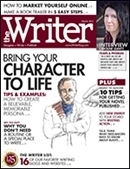
So, the wonderful writer Robin Garland interviewed me for The Writer. I'm thrilled and am anxiously awaiting my copies because the online preview doesn't quite work. You can SEE the article, but you can't read it. Sigh.
Soon, soon...
Published on February 14, 2012 19:15
Pamela Redmond talks about inventing the truth and The Possibility of You
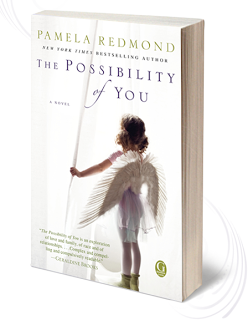
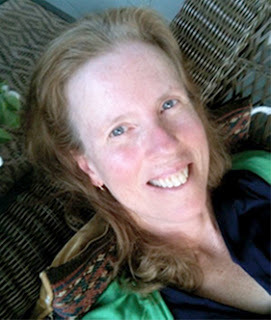
Pamela Redmond, as Pamela Redmond Satran, is the amazing author of five novels and the creator of the online fiction world Ho Springs. A New York Times bestselling humor writer, and a Glamour columnist, she's also the force behind the wonderful website Nameberry. And if that's not enough, several of her books have been optioned by Amblin Entertainment (that's the one helmed by Steven Spielberg.) Her new novel, The Possibility of You, about three very different women, grappling with motherhood, is as moving as it is provocative. I'm thrilled to have Pamela's essay here on my blog. Thank you, thank you, thank you, Pamela.
Inventing the Truth
By Pamela Redmond/The Possibility of You
When I was about three-quarters of the way through writing my new novel The Possibility of You, set largely in 1916 New York, I read an interview with E. L. Doctorow. Since Ragtime was one of the models not only for my own book but for the historical novel as we know it, I was eager to hear what Doctorow had to say about how to meld historical research with characters who feel vivid and contemporary.
His trick, he confessed: He doesn't do any research. None. He just writes the book as if the events are unfolding in a timeless era and place, and only after he's finished maybe look up some details to throw in for color. Historical accuracy? Not so important.
Now he tells me, I thought. The Possibility of You took me five years to write, partly because of all the historical research I undertook, and partly because I then had to figure out how to make my story come alive in the context of all that research. The challenge is different from that of a contemporary novel, in which both the writer and the audience share a broad base of knowledge about not only what life is like but about how people typically feel and behave, react and respond.
Writing about the New York of a century ago was a different proposition. Among the facts I discovered the found their was into my book: 1916 was the year that cars first outnumbered horse-drawn carriages in New York, and there was one stop light in all of Manhattan, at 42nd Street and Fifth Avenue, that was operated by hand. Thousands of cats and dogs were drowned in the East River, because of a (mistaken) belief that they carried the polio virus that infected 9000 children and killed 2500 of them that summer in America's first major outbreak of that disease. And in 1916, a pioneering woman psychiatrist first translated Jung into English.
There were lots of other squishier details I tried to find out, only sometimes succeeding. How did the mostly-Irish female servants like the heroine of my book feel about their jobs, about the women they worked for, about their own futures? I listened to oral histories at the Ellis Island Library, watched movies and books from the eras, read newspapers and hunted down diaries, but there was little from the viewpoints and in the voices of maids and nannies, and when they did talk, they didn't say much.
If only I'd known before I did all this work that I needn't have bothered! And I say that only half-jokingly. I can't imagine having written a meaningful story set in World War I era New York without knowing that the first birth control clinic in New York was opened that year, and quickly shut down by police. Or creating my heroine Bridget without knowing that Irish women were the only ones to immigrate alone – Jewish and Italian young women who came to this country in the same era traveled and lived with their families – and the only ones willing to work as servants.
While I had to learn these facts to create and populate my long-ago world, the research sometimes got in the way. Sitting in the New York Historical Society, reading every front page of the New York Times for 1916, I'd get caught up in some popular and related event of the time – the pandemic Beautiful Baby parades and contests, for instance – and decide my story needed one of those. And then I spent a lot of time writing it. But in the end, engaging as it may have been as an individual scene and as evocative of the 1916 world of mothers and children, it didn't belong in my book and ended up on the cutting room floor.
There were other historical details that were so wonderful I couldn't bear to leave them out, as tangential as they may have been. The goat carts that were a fixture of the time in Central Park, for instance, manned by poor children to be enjoyed by rich ones. Or the way the rivers circling Manhattan looked back then, clogged with boats chugging black smoke, doing the work now spread among planes and trucks and trains.
But in the end, I had to let go of all my research and let the characters and plot take the lead. I had to make Bridget a believable, sympathetic heroine independent of her era and her situation, to make the tension and yearning between her and her employer Maude as real and palpable as that between my contemporary heroine Cait and her lover.
Does that mean that the best tack when writing a historical novel is, like E. L. Doctorow, to eschew research all together? To simply create your characters and your plot as if they existed independent of time and space?
I'm not sure I believe that's even possible, any more than I believe that Stephen King digs up his brilliant plots, as he claimed in his book on writing, like metaphorical diamonds buried in the dirt of his backyard. But I know that too much research can get in the way of the kind of invention on which every novel depends, the creativity that liberates fiction from reality, and in the process makes it truer than any fact.
Published on February 14, 2012 09:06
February 13, 2012
Happy Valentines Day! Elizabeth Benedict talks about writers valentines to their mentors
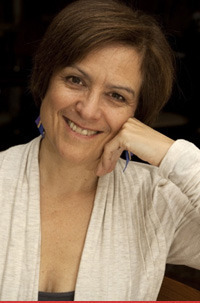
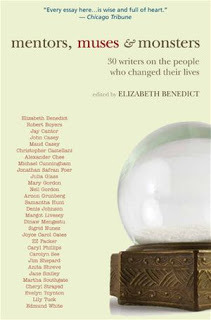
Elizabeth Benedict is an acclaimed, bestselling novelist, editor, teacher and an all together fabulous person to boot. She's the author of five novels, including Almost, and of The Joy of Writing Sex: A Guide for Fiction Writers. Her latest book, Mentors, Muses & Monsters: 30 Writers on the People Who Changed Their Lives, was just published in paperback by Excelsior. (It's available on Kindle and Nook) and it's racking up the raves. Chicago Tribune made it an Editor's Choice, and The Christian Science Monitor called it "mesmerizing." What better Valentine's Day gift than this wonderful essay.
Writers' Valentines to Their Mentors This is not news: Writers are famously cranky, infamously jealous, hopelessly self-involved. But several years ago, I unleashed a whole lot of gratitude and love in a group of wonderful writers. It happened like this: In 2008, hours after writing a tribute for Tin House to one of my writing mentors who had recently died, Elizabeth Hardwick, with whom I studied at Barnard, I did some on-line research and saw there was there was an important volume missing from the shelves: stories about writers and their mentors, the people who encouraged us, prodded us, gave us the crazy idea that we could become the cranky, jealous, self-involved people we've become. There was no such book, no such collection, and only one memoir about a mentor, Alex Wilkinson's about William Maxwell. Within an hour, I came up with a title I thought would encompass as many kinds of stories from fiction writers as might be out there – Mentors, Muses and Monsters . I liked the alliteration, and I liked the idea that not all the people who helped us were angels, and not all the stories should be sugar-coated. I knew a story or two about mentors who became, over time, monsters. My criteria for asking contributors: they had to have published at least one work of fiction, and had to know a thing or three about writing essays. Cheryl Strayed's two astonishing essays in Best American Essays convinced me to ask her. (And what a good idea that turned out to be! She earned a Pushcart Prize and a Notable Mention in the Best American Essays 2010, for her essay on Alice Munro.) Within weeks of issuing invites, I had several dozen writers who wanted to tell a story. But the categories didn't break down as I had anticipated. Many had stories of people to tell. Others had books and unmet writers to thank. And several had experiences, jobs, periods in their lives that made the difference. Jonathan Safran Foer wanted to acknowledge Israeli poet Yehuda Amichai. Sigrid Nunez wanted to remember Susan Sontag, with whom she lived in her twenties while dating Sontag's son. Jay Cantor had studied with Bernard Malamud. Jane Smiley was eager to thank her Iowa Writers' Workshop classmates, among them, Allan Gurganus. John Casey had Peter Taylor, who told him while he was a Harvard law student, that he should forget lawyering and become a writer – much to the chagrin of Casey's parents. Months later, with a deadline and a contract from Free Press/Simon & Schuster, the essays began to appear in my computer, and I still remember how dazzled I was to read so many of them. I knew the pieces would be good, but had no idea how good they would be – and how seriously each writer would take this assignment. As the pile grew larger and richer – Michael Cunningham on Virginia Woolf, Joyce Carol Oates on Alice's Adventures in Wonderland, Lily Tuck on Gordon Lish, Dinaw Mengestu on running an after-school program in Harlem, Carolyn See on her pornographer father – I realized that these essays fell into a category of their own. The gratitude each writer wanted to convey, the recollection of life before and after the mentor's influence, the unique value of a person or a moment that altered the course of our lives, that gave us purpose and a particular kind of nerve – all of this intensity asked something special of the writers. The meaning and complexity of these people and events asked the writers to devote their best story-telling selves to the task. Each seemed determined to write a piece as powerful as the experience itself. Each is a love letter, even those that end with a sprinkle of hard feelings. And I'm honored to have brought this book and these wonderful essays – these complicated Valentine's to teachers, writers, to books themselves – into being.
Published on February 13, 2012 14:03
February 9, 2012
Julianna Baggott talks about the audacious magic of Pure, selling out (or not) and so much more
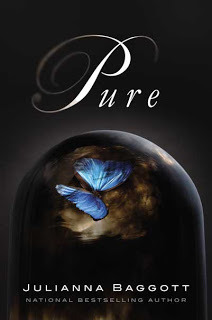
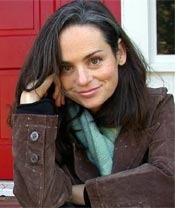
The first thing you need to know about Julianna Baggott's extraordinary new novel Pure is about the packaging. When the arc came to me, it had a little sticker on it which said (if I'm remembering right), "Surprise inside!" I opened the book and out flew a big vivid blue butterfly! I watched it spin around the living room and then I was so delighted, I promptly rewound it so I could get it to do it again. Pure is both startling, strange, and thought-provoking and such a wonderful read that she had a movie deal with Fox before the book was even published.
I asked Julianna if she would write about the experience, and I want to answer her question. No, Julianna, you haven't sold out. You've burst forth.
Is Baggott a Sell Out? Or How does it feel to write genre?by Julianna Baggott
So, PURE is my eighteenth book, but, in so many ways, seems like my first. A post-apocalyptic thriller, it's such a huge departure for me, as a writer. I've written literary novels, whimsical novels for younger readers, women-centric fiction and three collections of poetry. I was in Best American Poetry last year and will be there again this upcoming year; I write contemplative personal essays that have appeared in The New York Times, Boston Globe, NPR ...
I've dabbled and waded into genre, into entertainment, yes. But with PURE, I stormed the gates of genre, scared, but with torch in hand. And what did I find there? Well, first, wait. Let me tell you how it felt.
In a recent blog post for my New Year's Resolution (which was the resolution to have more resolve), I used this line "we're resolving to be bold, professionally (so much I want to do visually, narratively, weirdly, fiercely... gloves off, literary handcuffs gone)" and it felt like a dangerous confession. I was wondering if any of my readers -- many of whom are literary writers and poets -- would wonder what I meant by "literary handcuffs gone". There were a number of responses to the post on Facebook, but no one mentioned literary handcuffs or what I could possibly mean by the fact that I'd shed them.
This is what I meant. As a writer, we have all kinds of shackles. Some want a real readership and cow to that. Others sometimes hold those who want a real readership in disdain, but often they're shackled by the desire for respect. Because without readership, you need at least to garner some respect, right? Let's be honest; many of us want both.
And before you misunderstand and think that I believe both desires to be somewhat corrupt, let me set you straight. Desire is desire. Whatever motivates a write to get to the page is better than no desire at all. It can be rocket fuel. It can be something that burns in you. It probably goes back to our mommies and our daddies. And likely if you have it, it gets you to the page, but what keeps you there is the struggle -- the bear wrestling -- of story, image, character, creating the airtight and beautiful extended lie of fiction and the pressure of white that collects around the poem like so much snow, whispering, "Deserve me."
So, yes, I'd started to feel the chafe of literary shackles on my wrists -- the need to be beautiful line-by-line, to rely on giving the gift of language while sacrificing story, to create an internal structure of images to support the work instead of deep characterization, etc... All of these good things that had kept me at the page for so very long -- they were oppressive.
And what was building up in me was a deep restlessness. I wanted to take on something massive in scale, but to also be urgently intimate in the telling.
And so I stormed the gates of genre because I'd never really seen much of it through the bars. Once inside those gates, what I found were beautiful architectures, old and sturdy ones, ornate and striking. The buttresses and spires and gargoyles. With these structures, I could build the thing I desired.
I was terrified, I should mention that. I'd written a novel in which the main character has a doll-head fused to her fist who hides in an ashen cabinet. I'd written about a boy who escapes a Dome to find his mother. I set two lives on a collision course in a landscape populated by Beasts, Dusts, Groupies ... which I can't even truly explain for you here.
The novel is called PURE, and I've spoken here about the desire for readership, for respect -- these writerly impurities. I don't know -- and never will -- truly understand what makes me write, especially what makes me write so damn much. Sometimes it's as simple as: this is the way I have to process the world, and other times it's much more complicated.
I know that my literary friends will say that I sold out (the film rights to Pure sold before the novel did). But I don't know what that means when, day after day, I labored over this work, not knowing if 431 pages later, anything would come of it. All I know is that it felt good. It felt like a liberation. And now that I've found a way through the gates, I invite literary writers to come for visit. I've got a torch. I know a few of the cobbled streets. Come and see for yourself what's here.

Published on February 09, 2012 07:45
February 7, 2012
Pam Houston talks about Contents May Have Shifted, why she loves the publishing business, writing students and much more
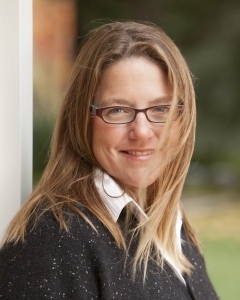
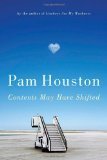
Every since I read Cowboys are my Weakness, I've been a deep admirer of Pam Houston's writing. Prickly smart, gorgeously written and wryly moving, her work doesn't just stay with you, it wins prizes, including being part of the Best American Short Stories and nabbing the O'Henry and Pushcart Prize awards. Her latest, Contents May Have Shifted, is a thoughtful and sublimely written look at a life's journey. I'm really thrilled to have Pam here and I can't thank you enough, Pam.
I love the whole idea of your new book, that problems are part of life, and what we do with our "baggage" affects our life. Is this hard-won knowledge or is this something you've always known?
That's such an interesting way to describe my book. I think in order to more accurately reflect my own experience I would have to change the language just a bit. First I was numb, then I went to therapy and learned to feel my feelings, which included a lot of extremely unpleasant ones, then I learned to feel the difference between what felt good and what felt bad, and that, more than anything else, changed my life. Not that I don't still carry about fifteen suitcases and a couple of trunks of nonproductive sludge around with me, maybe a snowboard and a guitar or two…one of those wedding dresses they won't let you hang up in the closet on the airplanes anymore…but I digress.
As I tell my students over and over, we only love the flawed characters, by which I mean the realistic ones. It is like Ruby says in Contents, ""Oh, Pam, Sofree lives in a hole. You…me…everybody lives in a hole. But what's great is if you go over and tap on the wall of your hole, you find out we're all connected." What struck me so much about your novel was the voice, which felt different to me than in your other novels (all of which I've loved.) Was this a conscious choice? How do you usually find your way into character?
I would be interested in hearing in what ways you think this voice is different. I've grown up some more, I hope. One always hopes for that. When I asked myself how I wanted this book to be different I knew what I really wanted was for the language to work harder than ever before. I read a ton of poetry, and this book in some ways owes itself to the books of poetry I love best. Once I had the book essentially done, like draft 15, I spent four months doing nothing but compressing the language. I pulled up all the widows, the words that spilled onto the next line at the end of a paragraph, and the widowed sentences that spilled over onto a new page at the end of each section, seeing how tight I could make it. There is also something about turning 50, I think, which I did this year. There is something in me that is tired of hearing my own voice apologizing. I hope there is less apology in this book, more celebration of voice. Can you talk about your process? Do you outline or are you a more organic sort of writer? Do you ever get writer's block and wish you had become an electrician instead?
Outline is one of those words that makes the hair stand up on the back of my neck. Likewise: index cards. If you had to use index cards to be a writer, I would take up watercolors.
My process is pretty simple, and endlessly renewable. When I sit down to write I ask myself what out in the world glimmered at me in recent memory…the check out girl at the Tattered Cover with The Incredible Lightness of Being hat tattooed on her chest, the sound of my elderly horse's thirty year old teeth crunching his sweet feed, the I-phone emoticon that is a pile of shit with a smiley face on it, the sunset pastels on of a rare clear coastal January Oregon sky. I collect those, until there are so many of them I fear I will start to lose track of them. Then I find a form to fit them into. Sometimes that just means I line them up in some kind of semi logical order and make a roughly chronological story out of them. In the case of Contents, I wanted to see what would happen if I tried to keep them more or less discreet from one another, and arranged them in an order that was governed by association, rather than logic or time. I believed that narrative progress would happen in spite of my attempts to thwart it, story arc--whatever you want to call it—character growth. I believed story is a big sleeping dragon that lies under every book and even if you don't tend it, it will let you know it is there. I was counting on that this time, and it didn't let me down.
I have never said the words, I have writers block. I don't know exactly what it means, in the same way I don't know exactly what a nervous breakdown is either, though it is conceivable that I have had one. It is conceivable that I have both. It is certainly true that I have gone for long periods of time without writing. But then one day I just can't stand myself anymore and I sit down at the computer. What would I be if not a writer? Maybe a chef or an organic gardener or a designer of adventure trips for the good natured and well heeled. Maybe one of those people who teach Border Collies how to run those courses. Definitely not an electrician. You live on a ranch, but you also teach at a bustling university. Do you ever feel shell shocked going from the peace of the ranch to the hustle of a school? And do you feel that teaching helps your own writing?Teaching does not help my own writing, but I don't believe it hurts it either, and when I turn my attention to helping others find their voices, it does help me feel like I am doing something of value in the world. I love to teach. I love to talk about contemporary literature. I love to judge contests. I even love sitting down with a whole pile of student manuscripts—still--love trying to unearth what it is they were going for, and what I might say to help them get there. I love this whole business. The book tours. The book clubs. Writing reviews and blurbs. I used to keep my mouth shut about that because I know it is seriously uncool to say so. But really, I am so grateful to have this occupation where I get to do something different nearly every day, and all of it involving people, language and story. I even like the bouncing back and forth between Davis and Creede. Though in Creede I get accused of being an intellectual elitist, and in Davis they think I am so quaint as to be absurd.What's obsessing you now?I want to write about being 50. I want to write something about how obvious it is (though no one tells you til you get here) that the 50's would be, for women, the best decade of all. It takes a couple of decades to stop making it be all about the men…and then another stretch of years to really own our own successes I think, our own voices…to fess up to the knowledge we have acquired and for God sake to stop apologizing. I have been 50 for seven days now and I have never felt better, freer, more likely to do just about anything. I also have an essay to write about Mongolia, where I spent this last September….that one might have to come first. Travel-wise, I want to go back to Istanbul, and this time travel widely in Turkey.
What question didn't I ask that I should have asked?Oh, I think you did very well…..Thanks! Pam
Published on February 07, 2012 20:08



